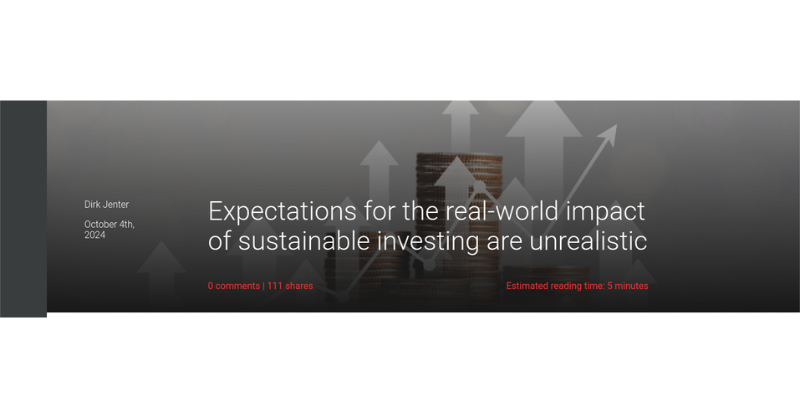
Sunday Brunch: how to talk to asset managers ...
Business 101 - first understand how the people you want to influence actually think. This also applies to those who want to influence companies and asset managers. Start with how they think and tailor your message to focus on what they see as important.
One good thing about taking some time off in September, other than missing the school holiday rush, is that it gives you time to think. There has been a lot of talk within the sustainability community about why the current approach to getting companies to act on sustainability doesn't seem to be delivering the changes people want.
Intuitively it has felt that part of the problem has been that we have been approaching this challenge from the wrong direction. Companies and asset managers care a lot about financial return. It's what keeps them in business. And so we should be ensuring that our communication with both groups reflects this fact. We should be emphasising where good sustainability practice makes good business sense.
And of course, at the same time lobby governments and society to bend the rules toward more sustainable practices.
But, up until now I really haven't had concrete evidence to back this 'feeling' up. Which is why a recent research paper from Edmans, Gosling & Jenter was so useful. They looked at what asset managers actually do with regards to sustainability.
And guess what?
Traditional and Sustainable asset managers are a lot more alike than we think. And they both care a lot about financial performance - partly I would argue because that is how they are remunerated, not just directly by clients, but also as a contributor to making their funds bigger, and more profitable.
The good news is that this tells us a lot about how we can best talk to asset managers in a way that they are likely to respond.
It's free to become a member ... just click on the link at the bottom of this blog or the subscribe button. Members get a summary of our weekly posts, including What Caught Our Eye and Sunday Brunch, delivered straight to your inbox. Never miss another blog post !
Expectations for the real world impact of sustainable investing are unrealistic.
These are their words, not mine ! The link above takes you to the LSE blog, if you want to read the full paper, which I highly recommend, click here.

Let's start at the end, what did their study find. To quote the blog by Dirk Jenter ...
"most of the investors we surveyed, including a majority running sustainable funds, said they wouldn’t voluntarily sacrifice even one basis point of return to advance ES goals, citing their fiduciary duty to clients. That means most managers, regardless of their fund’s label, will incorporate ES performance into their investment decisions only if they believe that doing so will boost financial returns or if they are forced to because of fund mandates or other constraints.
And, when asked what drives a company’s long-term value, managers in both camps ranked ES performance as significantly less important than several other issues."
Regular readers will know that this doesn't come as a surprise. Having worked in the industry for close on three decades this was my impression as well.
But - it's not as bad as it looks
This might seem discouraging. After all, getting asset managers to put pressure on companies to act in a more sustainable manner is a key lever for many sustainability programmes. But as with most things relating to sustainability, the underlying reality is more complex (and positive) than this quote suggests.
First up, most asset managers think that environmental and social (ES) issues are important from a financial perspective. When asked by the study to rate the financial importance of eight specific ES issues, from greenhouse gas emissions to employee well-being, 85% of respondents, including 78% per of traditional fund managers, rated at least one ES issue as material.
This means we get over the first hurdle. Asset managers care about ES issues. But this is not because they accept the moral case, but because they see them as potentially being financially important.
And what about their contribution to financial performance? 73% of respondents managing sustainable funds expect companies with good environmental and social performance to deliver positive abnormal returns, and 45 per cent of traditional managers agree. A bigger gap between the different fund types, but still common ground.
And a majority of both sustainable and traditional fund managers (67% and 61%, respectively) believe companies that perform poorly on environmental or social issues will deliver negative abnormal returns.
Equally interesting, by far the most popular reason for believing the first ES statement is that it is seen as signalling a well-managed company. As a group, asset managers care about good governance, and good environmental and social performance is seen as a good indicator that the company is well run.
This makes perfect sense to me. The ES challenges are going to bring about some fundamental changes to how companies business models will work in the future. Asset managers want company boards and management to prepare for the future, not just react when change happens. And this applies as much to ES issues as it does to any other type of external risk or opportunity.
What is the one key message that I took from this research?
Focus on the ES issues that can have the greatest financial impact on a company. Educate asset managers as to why these issues are something they should care about. And get companies to explain, in detail, how they are going to prepare for the future.
This doesn't mean that the other ES issues are not important. But the lever for them is less about getting investors to act, and more about social and political pressure.
One last thought
Doing nothing in the face of upcoming risks can be massively value destroying for companies, leading to both shareholders and lenders losing out.

The bottom line - all financial investors should be worrying about the longer term. And if the company you are involved with is not facing up to the upcoming changes, and properly preparing for them, you really should be questioning why you are invested.
This is something asset managers talk about all the time in the context of traditional investing risks, but it applies just as much to material sustainability risks (and opportunities).

Please read: important legal stuff.


